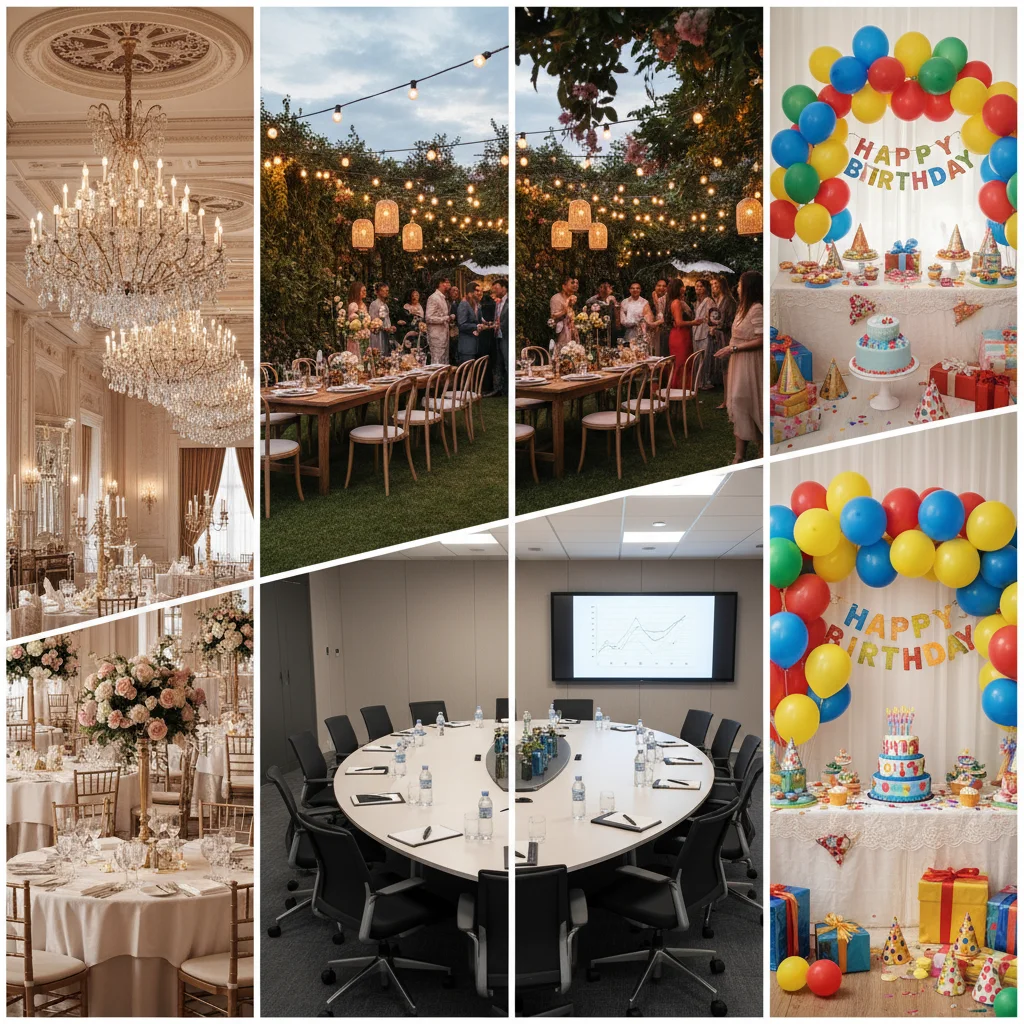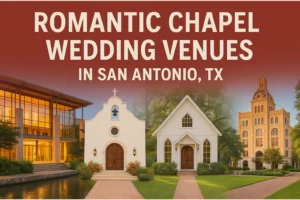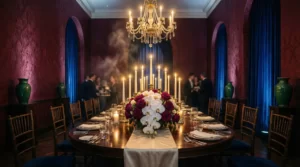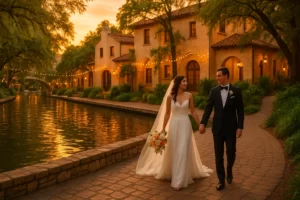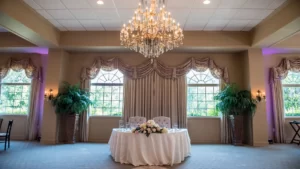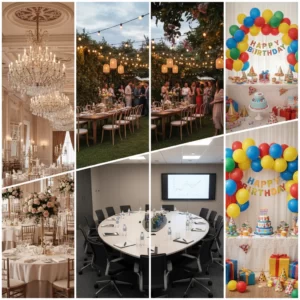Ultimate Guide to Party Venue Rental Costs (2026): How Much Does a Venue Cost for a Party?
TL;DR: Event Space Costs at a Glance
Party venues typically rent for $50–$275 per hour in 2026, while banquet halls now average $1,200–$1,800 per hour, and wedding venues cost around $13,200 on average nationwide. Prices vary significantly based on location, guest count, amenities, season, and whether the venue offers all-inclusive packages.
Budget-friendly options like community centers, parks, and restaurants may cost $200–$450 total, while luxury or high-demand venues can exceed $1,500–$5,500 per hour—especially in major cities.
Introduction: Understanding Event Space Costs
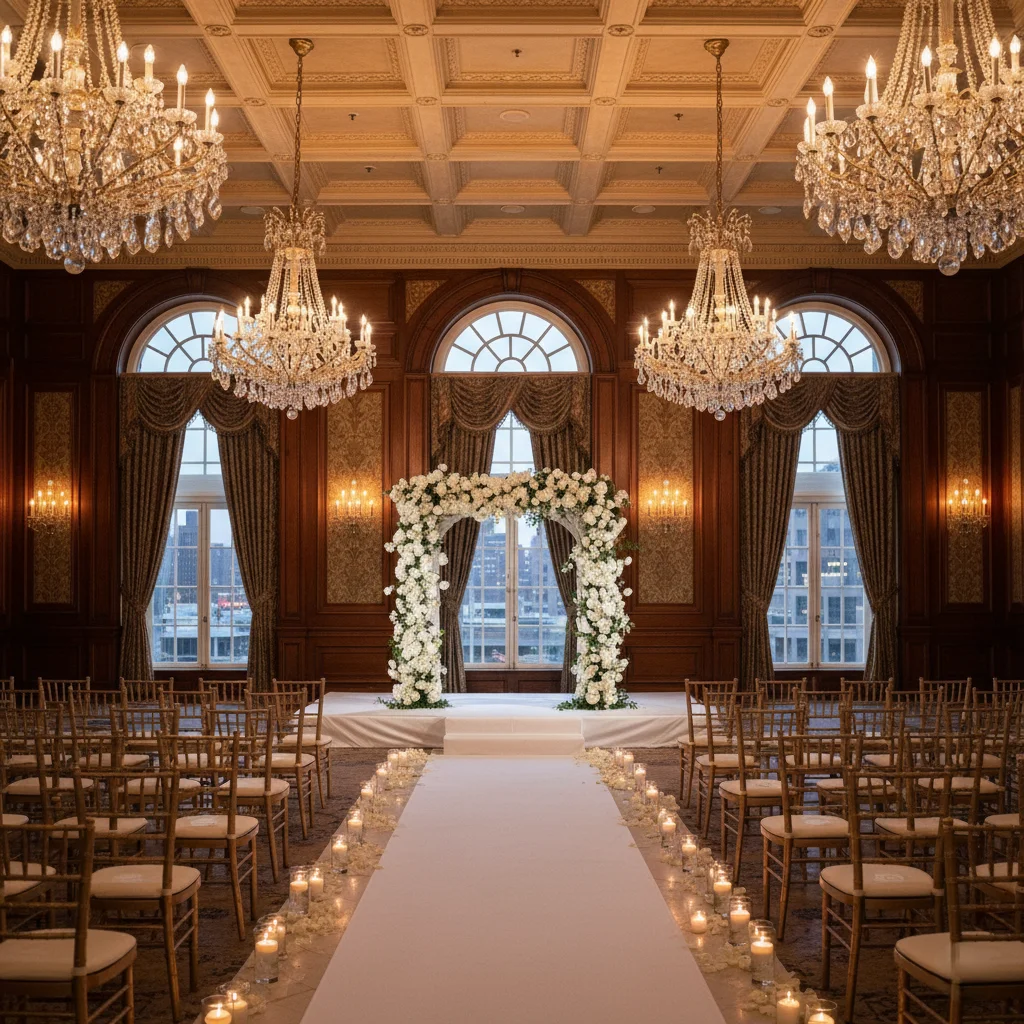
Planning a party or event? Whether it’s a birthday, corporate gathering, or wedding weekend, the venue is usually the single largest line item in your budget. Yet prices vary so widely that many planners feel unsure about what’s “normal.”
In 2026, the question “How much does a venue cost for a party?” still has no universal answer. You might find a rural community hall for $50, while a rooftop in NYC or San Francisco can exceed $5,000 per hour. According to updated projections based on 2025 wedding market data, couples now spend an average of $13,200 on wedding venues alone—about a 6–11% rise from previous years due to inflation and rising labor costs.
This guide breaks down real 2026 event space costs, how pricing models work, what factors drive costs up or down, and smart strategies to save money without compromising your event.
If you’re researching options in the capital, there are many excellent event venues in Washington DC that show just how much pricing can vary by city and neighborhood.
How Much Is a Venue for a Party? Understanding Event Space Costs
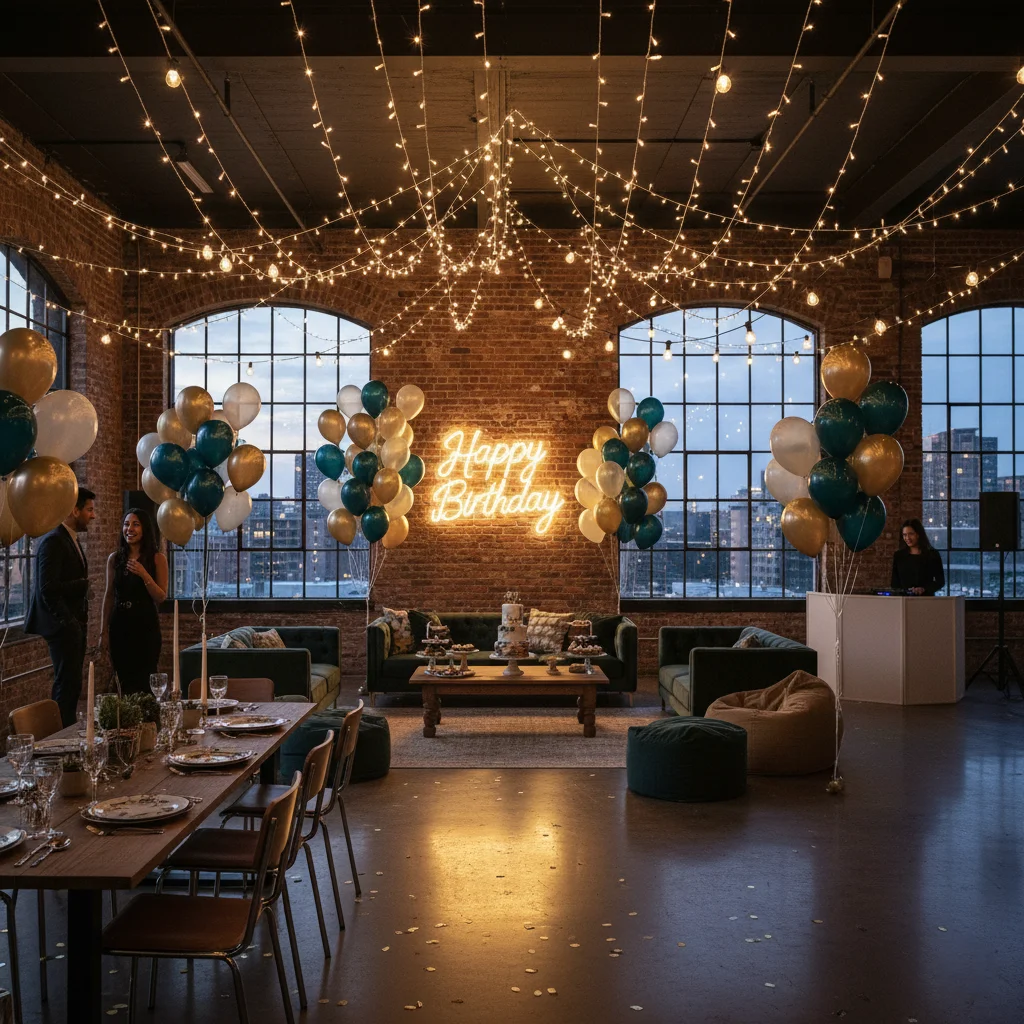
The National Venue Pricing Landscape
The average venue rental cost for a party ranges from $250 to $8,500 total depending on the size, location, and type of event.
- Small celebrations: $250–$2,500
- Mid-sized events: $2,800–$9,000
- Large or luxury events: $10,000+
- High-end city venues: $15,000–$25,000 with catering included
This is the baseline before comparing venue types, models, or amenities.
Hourly Rental Rates:
Most event spaces fall into these updated hourly categories:
Budget-friendly community spaces:
- $50–$175 per hour
Mid-range party venues:
- $175–$550 per hour
High-end banquet halls & hotels:
- $600–$1,800+ per hour
Luxury, rooftop & exclusive venues:
- $1,800–$5,500+ per hour
Most mid-range venues sit between $175–$400/hr, while banquet halls average $1,200–$1,800/hr.
Minimum-hour requirements (3–5 hours) remain common and can increase total cost.
Fixed Pricing Models:
Many venues offer flat-rate event pricing instead of hourly rental:
- Community halls & small venues: $250–$1,800 total
- Banquet halls (mid-size): $3,000–$8,000
- Wedding venues (2026 average): $13,200
- Luxury wedding venues: $18,000–$45,000+
Are Banquet Halls More Expensive Than Party Venues?
Yes—banquet halls continue to cost more because they include staff, catering options, tables, chairs, bar setups, and built-in services. While party venues may range from $50–$550/hr, banquet halls now average $1,200–$1,800/hr due to staffing and equipment costs.
If your event weekend includes pre-wedding activities, this resource explains when to host bachelor and bachelorette parties without creating scheduling conflicts.
Real-World Venue Cost Examples:
| Venue Type | Location | Cost Range | Notes |
|---|---|---|---|
| Wedding Venue | Florida historic venue, 10 acres | $6,600 | Includes tables, linens, overnight lodging for 10. |
| Wedding Venue | North Carolina all-inclusive venue | $10,200 | Includes DJ, cake, flowers, coordinator, lodging for families. |
| Wedding Venue | Texas Saturday peak-season venue | $12,300 | No additional amenities included. |
| Wedding Venue | Massachusetts venue + 13% fees | ~$16,500 | $3,000 rental, but total cost with food & services. |
| Wedding Venue | Comprehensive all-inclusive venue | $22,000 | Includes tent, catering staff, coordinator, decorations. |
| Party Venue | Birthday party venue (per-person) | $750–$2,300 per person | Per-person pricing model. |
| Party Venue | Small corporate event space | $600–$3,500 total | Total flat fee. |
| Party Venue | Large corporate venue in major metro | $6,000–$22,000 | Total flat fee. |
Wedding venues (from Reddit wedding planning communities):
- Florida historic venue, 10 acres, Saturday: $6,000 (includes tables, linens, overnight lodging for 10)
- North Carolina all-inclusive venue: $9,300 (includes DJ, cake, flowers, coordinator, lodging for families)
- Texas Saturday peak-season venue: $11,500 (no additional amenities included)
- Massachusetts venue + 13% fees: $2,800 rental (but total cost to ~$15,000 with food & services)
- Comprehensive all-inclusive venue: $20,000 (includes tent, catering staff, coordinator, decorations)
Party venues:
- Birthday party venue (per-person): $700–$2,000 per person
- Small corporate event space: $500–$3,000 total
- Large corporate venue in major metro: $5,000–$20,000
How Much Should I Budget for a Party Venue?
Most planners should allocate 20–35% of the total event budget for the venue.
General guidance:
- Small events: $300–$3,000
- Mid-size events: $3,000–$9,000
- Large/ upscale events: $8,000–$20,000
Location and guest count have the biggest impact.
After seeing how widely party venue costs can vary by location, size, and pricing model, many people find it useful to look at real venues side by side. Comparing spaces with clear pricing and usage details can make it easier to decide what actually fits your event — before reaching out or booking tours.
- Party and event venues across different cities and budgets
- Typical rental pricing, minimums, and inclusions
- Spaces suited for birthdays, corporate events, and private celebrations
Wedding Venue Costs by State
Wedding venue costs have risen 5–10% across most states in 2026 due to inflation and staffing increases.
- Lowest-cost states: Wyoming, Idaho, West Virginia
- Highest-cost states: New Jersey, New York, Massachusetts, California
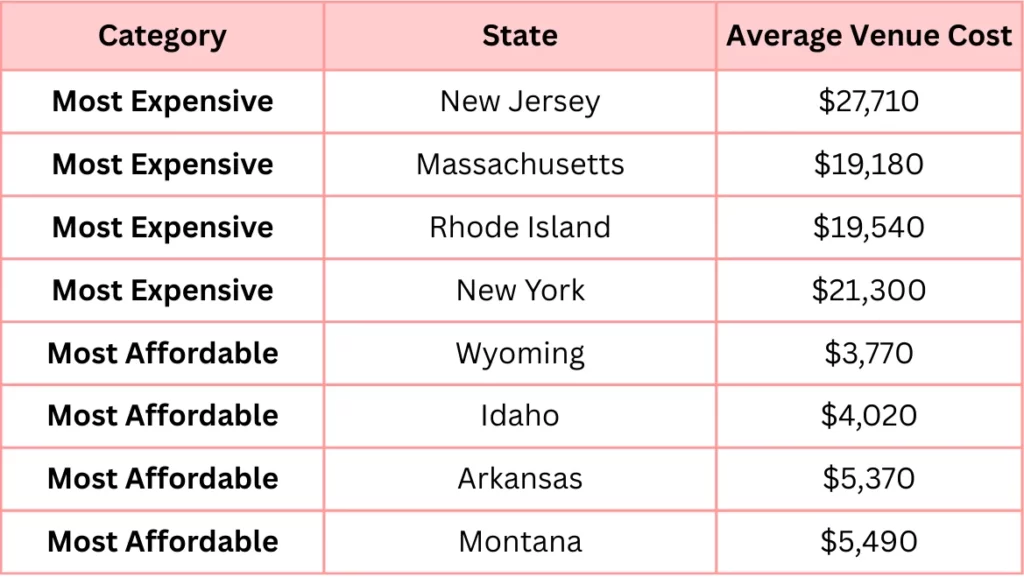
Major U.S. City Venue Rental Rates (Peerspace Averages)
(Peerspace + industry trends)
- NYC: $250–$5,500/hr
- Los Angeles: $200–$4,500/hr
- Washington DC: $175–$3,000/hr
- Miami: $150–$2,800/hr
- Chicago: $120–$2,500/hr
Rural + suburban areas remain 30–60% cheaper.
Additional Insight:
Rural and suburban areas are typically 30–60% cheaper than major metro venue rates.
For those comparing markets, browsing venues in Washington DC can illustrate how rates differ sharply from city to city.
Event space pricing varies widely because it depends on real estate costs, venue amenities, guest capacity, seasonal demand, and whether the venue is all-inclusive or bare-bones. Highly desirable locations, premium amenities, and weekend or peak-season dates significantly increase rates.
Understanding these variables helps you compare venues more accurately.
What Affects Party Venue Pricing? Key Cost Drivers
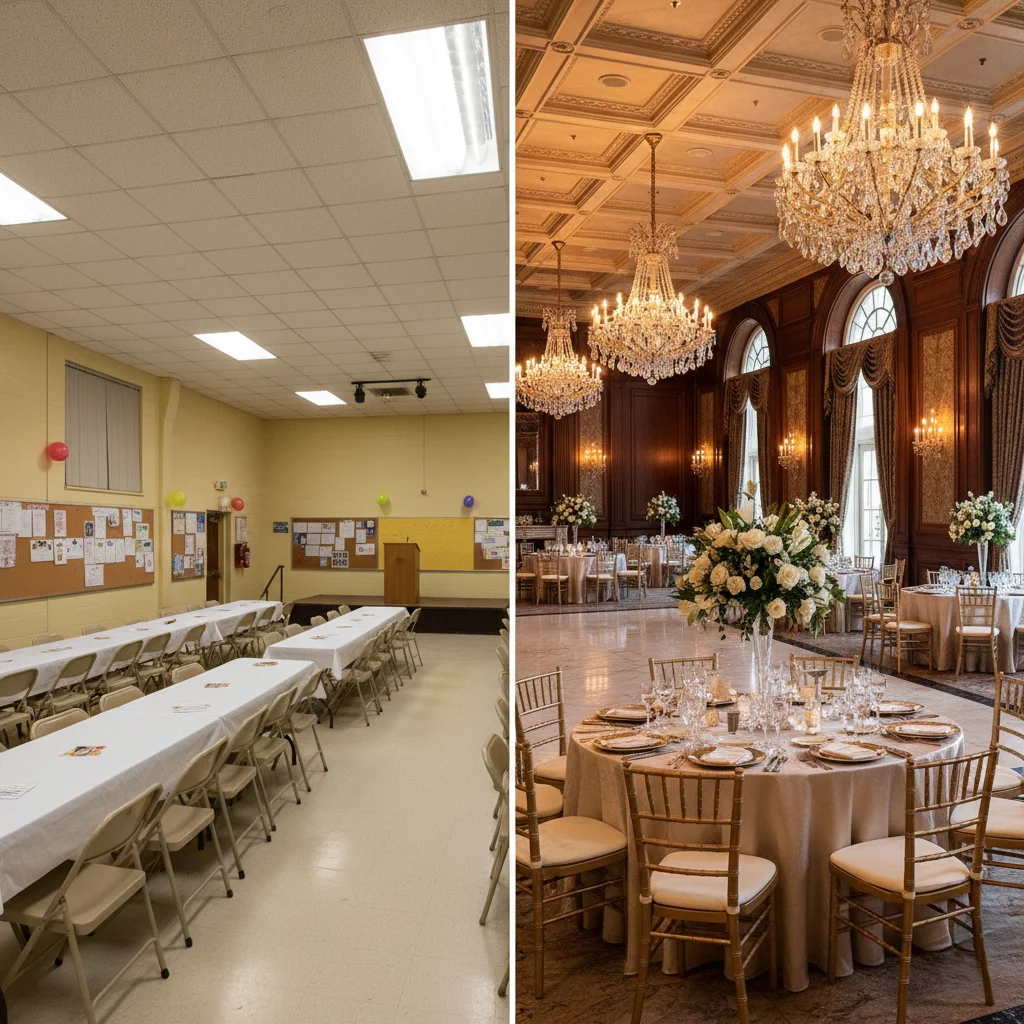
Venue costs aren’t arbitrary. Several interconnected factors drive pricing—understanding them helps you negotiate smarter and find better value.
1. Location & Geographic Market
The single biggest cost driver is where your venue sits on the map.
- Urban centers & major metros: Downtown venues in cities like New York, Los Angeles, San Francisco, and Chicago command premium prices due to high real estate costs, accessibility, and demand.
- Coastal & destination areas: Popular wedding destinations (Jersey Shore, Martha’s Vineyard, Miami) charge 50–100% premiums over inland regions.
- Suburban & rural areas: Venues in smaller towns and rural locations offer significantly lower rates—sometimes 50–70% cheaper than comparable urban spaces.
- Emerging neighborhoods: “Edge of downtown” or up-and-coming neighborhoods often provide better value than established trendy areas while retaining appeal.
Real pricing example: A comparable banquet hall might cost $2,000 per event in suburban Ohio but $8,000–$12,000 in nearby urban areas.
What Affects the Cost of Renting a Hall?
The cost of renting a hall depends on the size of the space, weekend vs. weekday pricing, whether catering is included, and whether the venue provides tables, linens, AV systems, or décor. Halls with catering packages can appear more expensive upfront but may reduce your all-in costs.
Couples looking further south will find a wide range of affordable wedding venues in San Antonio that make budgeting easier without sacrificing style.
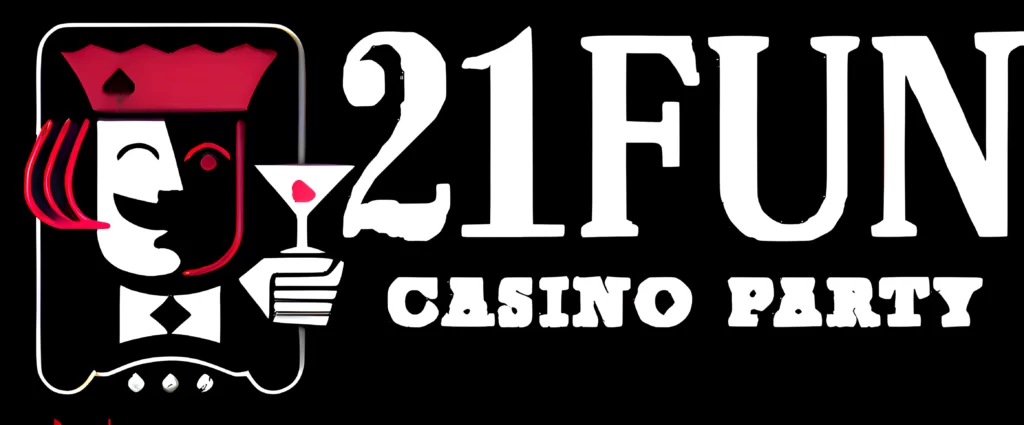
21Fun – Casino Party Rentals in California
2. Venue Type & Built-In Amenities
Different venue types come with different amenities—which affects both the base rental price and your additional rental needs:
| Venue Type | Base Rental Cost Range | Key Built-in Amenities | Best For |
|---|---|---|---|
| Hotels & Luxury Venues | $1,000+ per day or $500–$3,000 for conference rooms | Climate control, furniture, basic AV, parking, sometimes catering | Formal events, comprehensive services, all-in-one planning |
| Banquet Halls | $200–$3,800 per hour (average $1,200/hr) | Tables, chairs, dance floor, bar setup, often full kitchen access | Weddings, large parties, events with catering |
| Outdoor Venues (Gardens, Lawns, Parks) | $40–$300 per hour | Scenic backdrop, space (but minimal facilities) | Budget-conscious events (if weather cooperates) |
| Community Centers & Halls | $40–$150 per hour | Basic tables, chairs, often a kitchen | Casual parties, small events, tight budgets |
| Unique Venues (Warehouses, Farms, Lofts) | Highly variable ($300–$2,000+ per hour) | Minimal—you provide most décor, seating, catering | Creative, non-traditional events with design flexibility |
| Farmhouses & Outdoor Retreats | $180,000–$700,000+ per event | Scenic grounds, sometimes lodging for guests | Destination weddings, weekend celebrations, retreat events |
For readers comparing different types of party venues and pricing models, this guide to event space costs offers a helpful breakdown of what to expect.
3. Guest Capacity & Space Size
Venue pricing correlates with capacity:
- Smaller spaces (20–75 guests): $200–$2,000 total or $50–$300/hour
- Mid-size venues (76–200 guests): $2,500–$8,000 total or $200–$800/hour
- Large venues (200+ guests): $5,000–$25,000+ total or $500–$2,000+/hour
The oversizing trap: Booking a venue larger than your actual guest count wastes money. Event professionals recommend sizing venues with a 10–15% buffer for last-minute additions, not 30–50%.
4. Date, Season & Day of Week
Peak vs. Off-Peak Pricing:
- Peak season (spring & summer weekends, December holidays): Highest rates; some venues charge 50–100% premiums
- Off-peak (winter weekdays, November, January): Discounts of 20–40% common
Day of Week Pricing:
- Saturday vs. Friday/Sunday: Weekend rates typically 25–50% higher
- Daytime vs. evening: Lunch or afternoon events may cost 30–40% less
Booking timing:
- Early bird bookings (6+ months advance): 10–20% discounts possible
- Last-minute bookings (2–4 weeks): Can secure steep discounts if venues have openings
5. Duration & Hours of Use
How long you need the venue impacts pricing:
- Half-day events (4 hours): Lower flat rate or hourly rate applies
- Full-day events (8 hours): Typically bundled at 1.5–2x half-day rate
- Multi-day events: Can negotiate per-day rates lower than daily accumulation
- 24-hour+ events: Significant discounts often available
Reddit example: One venue charged $7,500 for 6 hours versus $14,000 for Saturday peak season—showing how duration extends costs.
If your event involves formal invitations, you may want to review this quick etiquette guide on RSVP meaning to avoid common missteps.
6. Included Services & Amenities
This dramatically affects your true all-in cost:
| Venue Type | Included Services | Budget Impact |
|---|---|---|
| High-inclusion venues | Tables, chairs, linens, flatware, basic décor, event day coordinator, kitchen facilities, AV equipment, parking & valet | An “expensive” $20,000 venue that includes everything might be cheaper overall than a $7,000 venue + $5,000 rentals + $4,000 additional coordinator fees. |
| À la carte venues | Bare space only | You arrange: rentals, catering, AV, parking. Requires more coordination and can lead to hidden costs. |
7. Popularity, Reputation & Demand
Established, highly-reviewed venues can command premium prices:
- Historic or iconic venues: 50–100% premiums due to prestige
- Instagram-famous locations: Rising prices due to demand from social media-savvy planners
- New or lesser-known venues: 20–40% discounts common as they build clientele
Large or complex events may benefit from understanding the difference between event planners and event coordinators, especially when comparing costs.
Venue Pricing Models: How Venues Charge
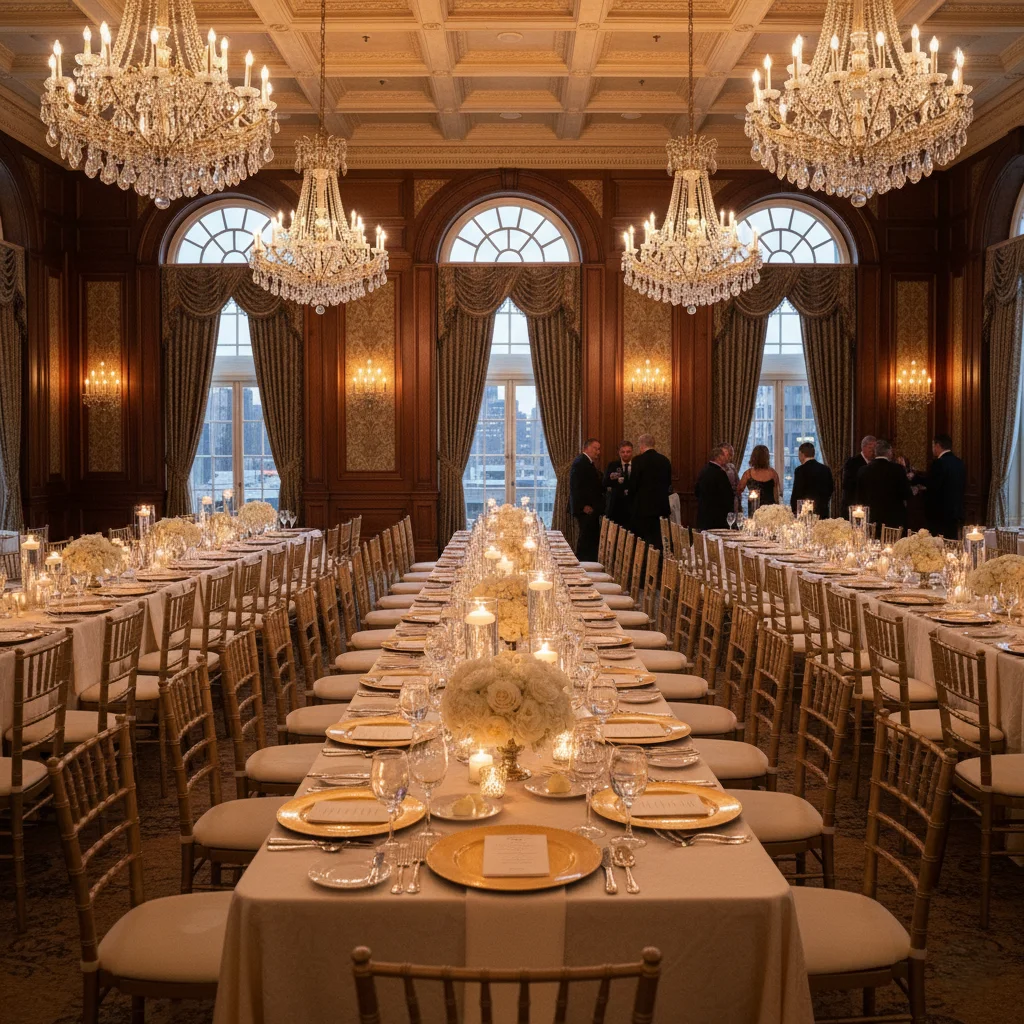
Understanding how venues structure pricing helps you compare apples-to-apples:
Flat Fee Model
- How it works: Fixed price per event, regardless of guest count or duration within booking window.
- Best for: Venues offering comprehensive all-inclusive packages; predictable budgeting.
- Example: $12,500 for your entire Saturday wedding (seats 50–150 guests, includes tables, chairs, linens, bar setup).
Couples seeking inspiration for elegant settings can explore this detailed look at a popular New Jersey event venue featuring premium amenities.
Per-Person Pricing
- How it works: Price per guest, typically including catering + venue rental combined.
- Typical range: $50–$250 per person (varies by region, inclusivity level).
- Example: $150/person for 100 guests = $15,000 (often includes food, beverage, basic décor, tables).
Hourly Rate
- How it works: Price charged per hour of venue rental; minimum hours often required.
- Typical range: $40–$2,000+ per hour depending on venue caliber.
- Best for: Shorter events, flexible scheduling, non-traditional venues.
- Example: 5 hours at $300/hour = $1,500 minimum for party space.
Revenue-Share / Percentage Model
- How it works: Venue takes a percentage (often 20–30%) of event revenue (ticket sales, bar sales) instead of flat fee.
- Best for: Events with high revenue potential (fundraisers, concerts, festivals).
- Best practices (from Reddit event entrepreneurs): If a venue proposes revenue sharing, negotiate a lower percentage (15–20% vs. 30%) or hybrid approach (small flat fee + lower percentage).
Tiered / Dynamic Pricing
- How it works: Rates adjust based on demand, date, and occupancy.
- Peak times: Higher rates
- Off-peak times: Lower rates or discounts
- Early bird: Discounts for advance bookings
- Best for: Venues seeking revenue optimization; flexible planners.
Anyone planning a wedding-related celebration should understand the difference between the ceremony and the reception, especially for budgeting.
What’s Included in Event Space Rental Fees?
Most mid-range venues include basic furniture (tables and chairs), lighting, restrooms, climate control, parking, and access during setup and teardown. Bare event spaces may include nothing but the room itself, while all-inclusive venues add décor, catering, AV, staff, and coordination support.
Always request an itemized list to avoid unexpected charges.
Venue Cost Breakdown: What’s Typically Included vs. What You Pay Extra For
What’s Usually Included vs. Not Included in Venue Rental
Included in Venue Rental
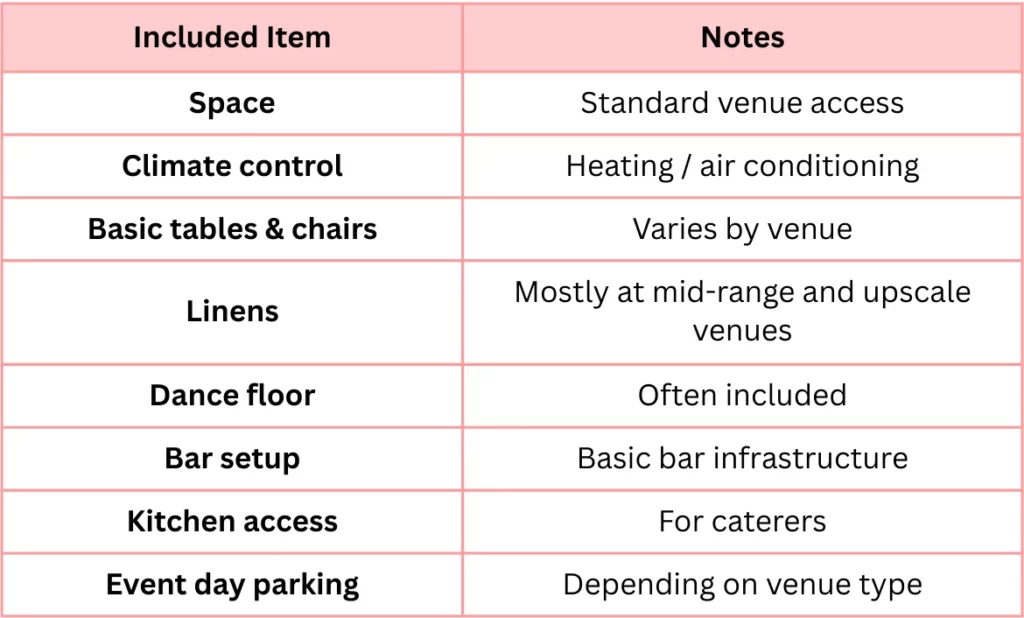
Not Included (Additional Costs)
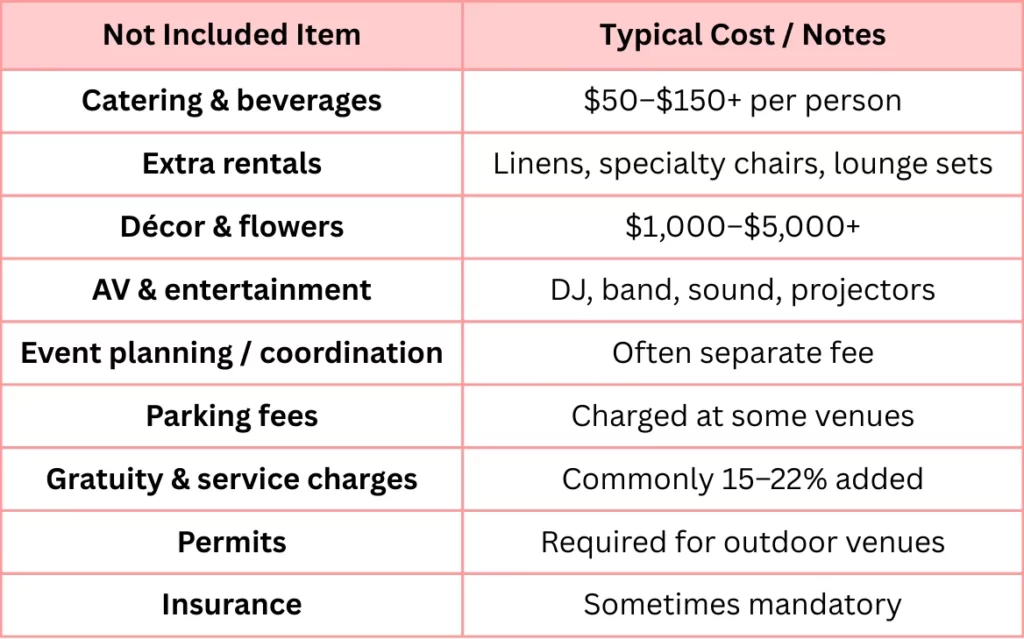
Important Insight
Critical Note: Many couples are surprised by service charges (15–23%) or house minimums that require a minimum catering spend.
Those wanting premium elegance can also explore the best wedding venues in San Antonio for spaces that balance charm with top-tier amenities.
Top 5 Budget-Friendly Event Space Alternatives
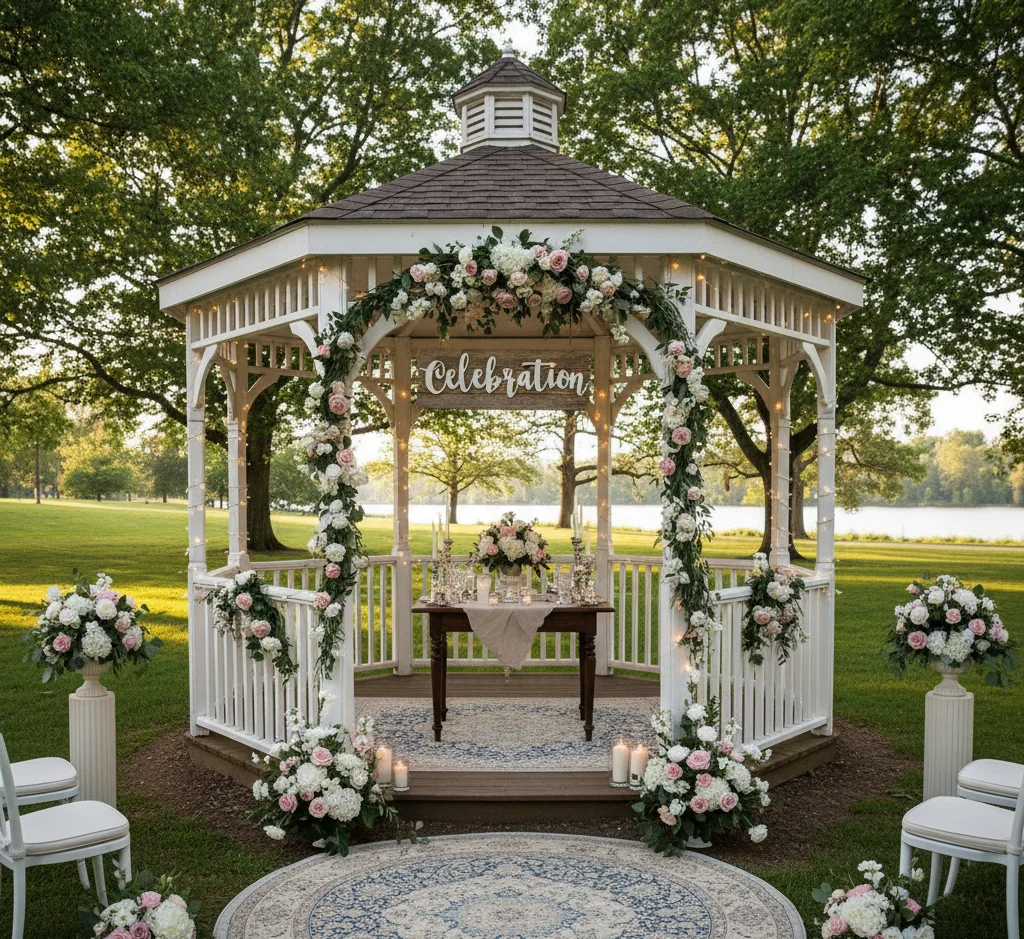
If traditional venues are outside your budget, consider these five affordable alternatives:
- Community Centers & Halls
- Cost: $40–$150/hour
- Pros: Affordable, accessible, often subsidized by local governments
- Cons: Limited amenities, less aesthetic appeal
- Best for: Casual parties, small events, tight budgets
- Public Parks & Gardens
- Cost: $50–$300 permit fee
- Pros: Beautiful backdrops, spacious outdoor areas
- Cons: Weather dependent; requires tent, restroom rentals
- Additional costs: Permits, tent ($1,000–$3,000+), portable restrooms ($300–$800)
- Religious Facilities (Churches, Synagogues, Temples)
- Cost: $200–$800 typically
- Pros: Affordable, often elegant architecture, inclusive community aspect
- Cons: May require member affiliation; limited flexibility
- Restaurants & Bars
- Cost: Often minimal/free if catering from venue; sometimes $200–$500 rental fee
- Pros: Catering included, full bar, elegant atmosphere
- Cons: Limited space, limited customization, loud atmosphere
If you’re organizing a birthday celebration, this breakdown of what party planners typically charge can help set a realistic budget.
- Co-Working Spaces
- Cost: $230–$3,000 depending on size
- Pros: Modern, affordable, flexible hours
- Cons: Minimal décor; limited catering options
- Vacation Rentals (Airbnb, VRBO)
- Cost: Nightly rental rate (often $150–$400/night)
- Pros: Residential feel, built-in kitchen, often includes lodging for guests
- Cons: May have occupancy restrictions; needs additional catering/rentals
- School Gymnasiums & University Facilities
- Cost: $60–$260 per hour
- Pros: Large capacity, affordable, sometimes off-campus bookings available
- Cons: Institutional aesthetic; limited built-in amenities
Those planning celebrations in Texas can explore budget-friendly options in this guide to birthday party ideas in San Antonio.
Strategies to Reduce Event Space Costs
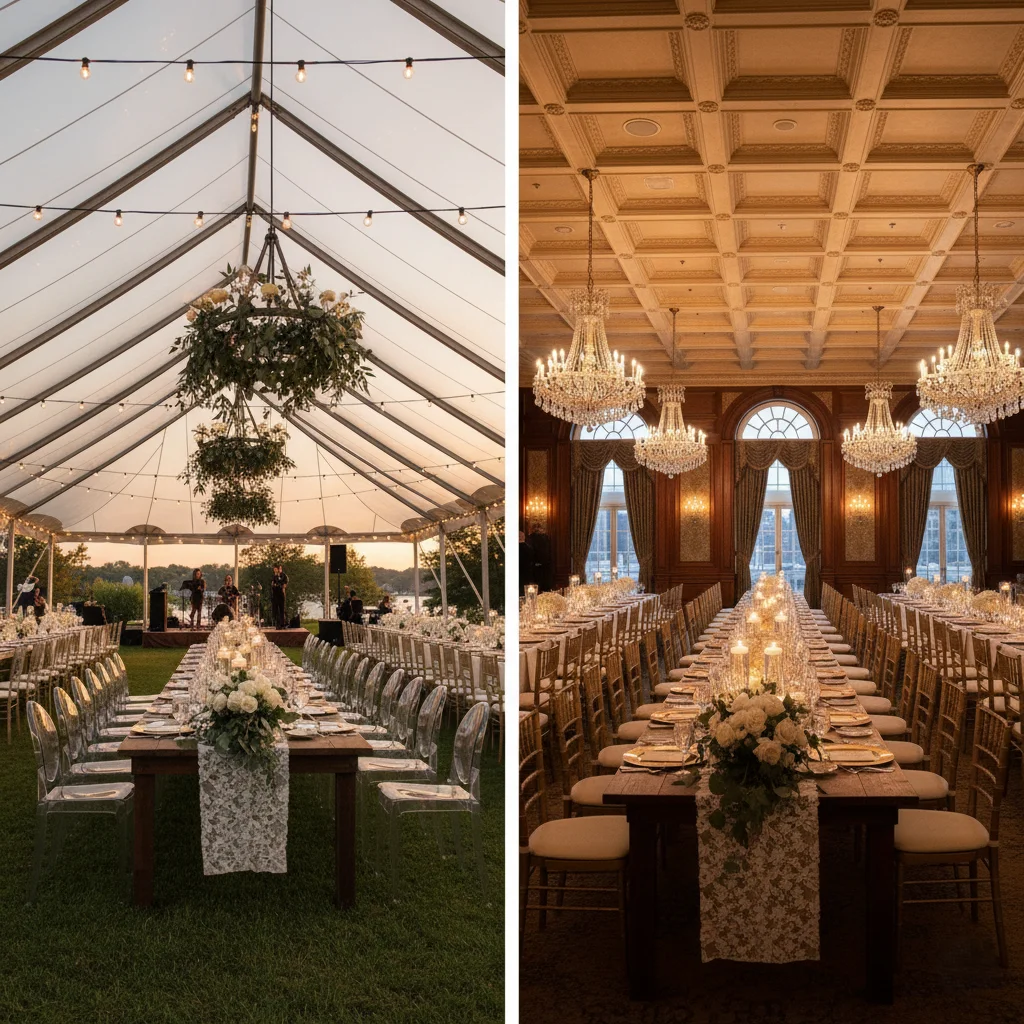
Negotiation works best when you’re flexible with your date, willing to choose off-peak times, or open to bundling services like catering or rentals. Many venues will reduce rates by 10–30% for Friday events, weekday celebrations, or multi-hour bookings.
Request price matching or ask whether outside vendors can lower your total spend.
- Choose Off-Peak Dates
- Savings potential: 20–40%
- Sweet spots: Friday evenings, weekday lunches, November-early December, January-February
- Example: A $12,000 Saturday wedding venue might be $8,000 on a Friday or $7,200 on a Tuesday
- Book 6+ Months in Advance
- Savings potential: 10–20%
- Strategy: Early bird discounts incentivize planners to commit early
- Negotiate Venue Packages
- Ask: Can you bring your own florist/DJ/catering?
- Negotiate: Fees for outside vendors (some venues waive or reduce these if you book catering)
- Bundle: Request package deals that combine space + catering + services at discount
- Size Appropriately
- Savings potential: 20–30% on overall costs
- Strategy: Match venue capacity to actual guest count; oversized spaces waste money
- Tactic: Ask about flexible contracts allowing room size adjustments closer to event date
- Consider All-Inclusive Venues
- Best value: Many all-inclusive venues appear expensive but cost less overall
- Example: $20,000 all-inclusive (food, DJ, coordinator, décor) may cost less than $7,000 venue + $4,000 catering + $3,000 rentals + $2,000 coordinator + $2,000 other
For engagement celebrations, this guide explains who traditionally pays for an engagement party and modern alternatives.
- Explore Emerging Neighborhoods
- Savings: 30–50% vs. established trendy areas
- Strategy: Research up-and-coming districts with lower real estate costs but growing venues
- Use Outdoor Spaces Strategically
- Savings on base rent: Often 50%+ cheaper
- Watch: Additional rentals (tent, permits, restrooms) can offset savings
- Hybrid approach: Combine indoor + outdoor spaces to reduce footprint in either
- Share Venue with Another Event
- Applicable for: Groups with flexible schedules
- Savings: 30–50% if splitting venue costs with another wedding/event
- Logistics: Must coordinate timing, setup, breakdown
- Negotiate Flexible Timeslots
- Approach: Ask for non-standard times (e.g., Friday afternoon instead of evening)
- Savings: Sometimes 15–30% discounts for off-hour bookings
For something different, unique wedding venues in Washington DC often double as stylish birthday or private party spaces, making them versatile choices.
Red Flags & Hidden Costs to Watch
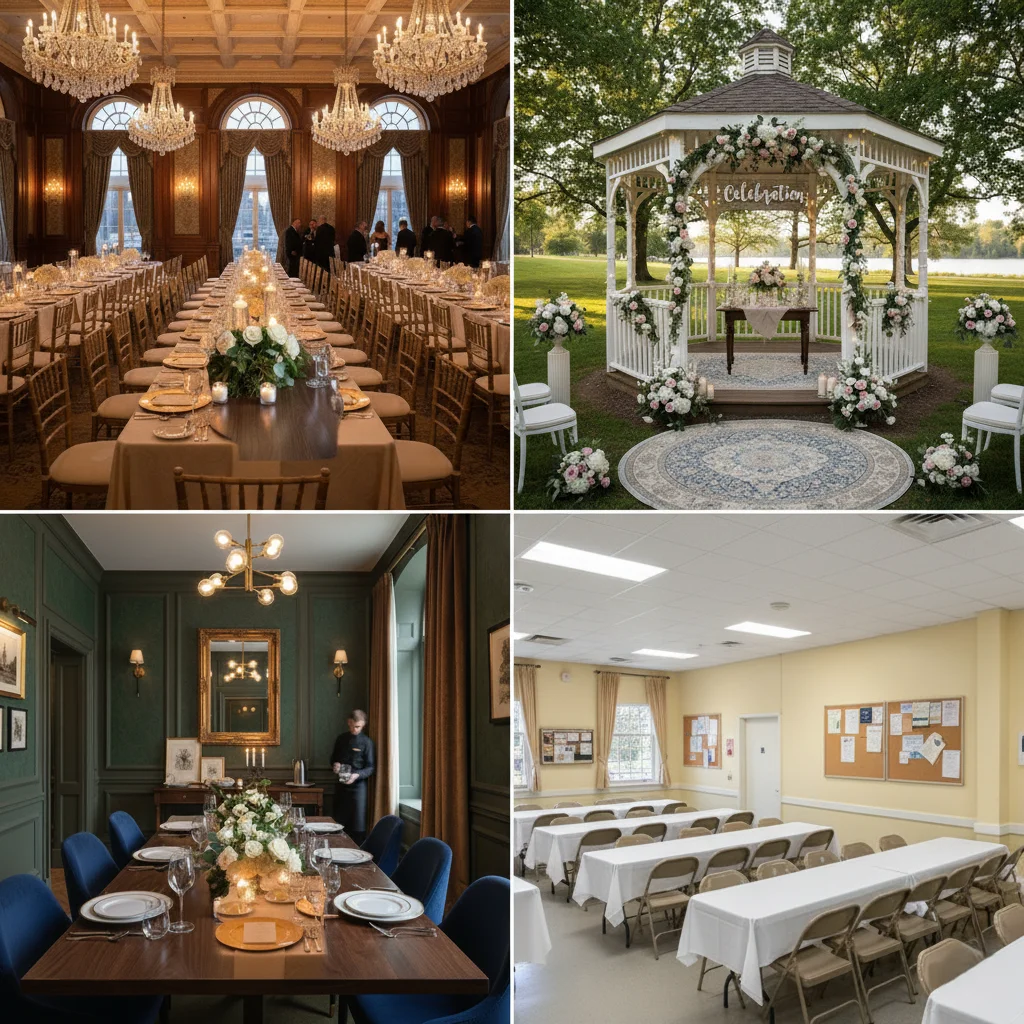
Common Hidden Fees:
- Service charges: 15–23% gratuity added automatically (not always obvious in initial quote)
- Venue minimums: Required minimum catering/beverage spending
- Setup/breakdown fees: Charged separately from rental fee
- Parking charges: Per-car or flat fees at some venues
- Equipment fees: AV equipment, WiFi, late-night food suddenly appear on invoice
- Gratuity on gratuity: Some venues add service charge, then expect tip on top
- Permit & license fees: Outdoor venues may pass licensing costs to client
- Peak-season surcharges: Unmarked premiums for busy dates
Hosting in big cities like NYC? These Instagram caption ideas inspired by New York are perfect for event photos and social sharing.
Best practices:
- Request itemized quotes in writing
- Ask explicitly: “Are there any additional fees or charges not listed?”
- Clarify service charges: Are they mandatory? Do they go to staff?
- Get written contracts with all fees detailed
- Negotiate: If fees seem excessive, push back or shop other venues
How Do I Calculate Event Venue Costs?
To estimate your total venue cost, add the rental fee, service charge, taxes, required catering minimums, equipment rentals, and any vendor fees.
A simple formula:
Total Event Space Cost = Base Rental Fee + Service Charges + Taxes + Catering Minimums + Rentals + Staff Fees + Add-Ons
This helps avoid surprises when comparing venues.
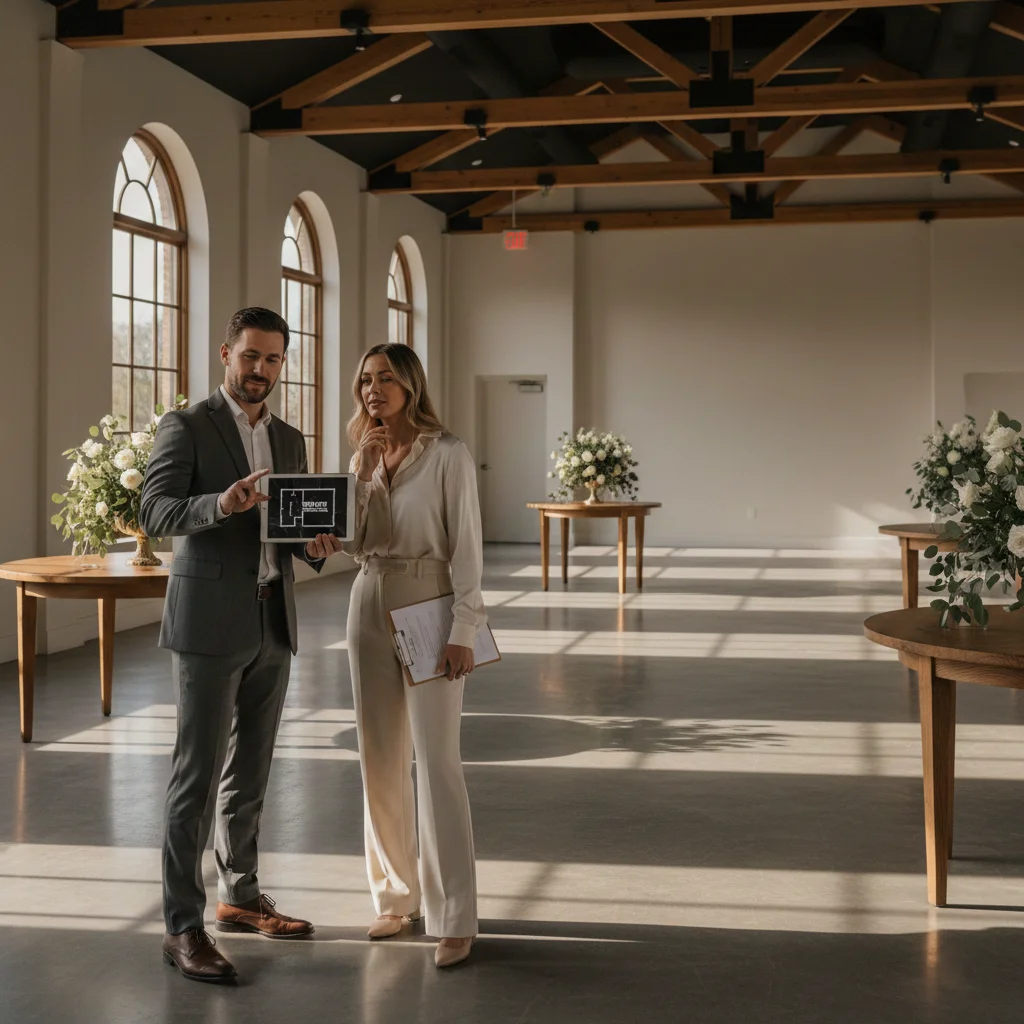
Searching for event planners near you?
Whether you’re planning a wedding, birthday party, corporate event, or private gathering, finding the right event planner can make all the difference. At greatEvent, we help you connect with experienced event planners in your area.
Contact us today and let us help you find the perfect event planner for your event.
Frequently Asked Questions
Is $13,200 typical for a wedding venue in 2026? ▾
Yes — $13,200 is the projected 2026 national average for wedding venues. Prices vary from around $4,500 in low-cost states to over $28,000 in high-cost states. Location, amenities, and season significantly influence final pricing.
What’s included in a typical venue rental? ▾
Mid-range venues usually include tables, chairs, linens, basic décor, lighting, climate control, and parking. Budget venues may only offer the space. Luxury venues often include event coordination, upgraded décor, and premium AV setups.
How much should catering cost per person in 2026? ▾
Catering costs now average $95–$110 per person nationwide. In major cities, this rises to $150–$250+ per person. These prices generally include food, non-alcoholic beverages, and staffing, but alcohol is often charged separately.
What’s the difference between flat-fee and per-person pricing? ▾
Flat-fee pricing is one fixed cost for the venue regardless of headcount. Per-person pricing charges based on guest attendance and often includes food. Flat fees benefit medium-to-large events, while per-person works best for smaller celebrations or controlled guest lists.
How far in advance should I book a venue? ▾
For peak-season dates, book 9–14 months ahead. For off-peak months (January, February, November), 3–6 months is usually enough. Weekday events often have more availability and may offer discounts for flexible planning.
Can I negotiate venue pricing? ▾
Yes — many venues offer negotiable pricing, especially for weekday events, off-peak seasons, early bookings, or when bundling services like catering. Savings of 10–30% are common if you’re flexible with your date and timing.
What’s a reasonable hourly rate for event space in 2026? ▾
Budget venues: $50–$175/hr
Mid-range: $175–$550/hr
High-end venues: $600–$1,800/hr
Luxury & rooftop venues: $1,800–$5,500/hr
Prices are higher in major cities due to demand and real estate costs.
Should I use an all-inclusive venue or build à la carte? ▾
All-inclusive venues provide convenience and often better value since they bundle catering, décor, staffing, and coordination. À la carte planning offers more customization but can result in higher total costs and more management.
How do I find affordable event space? ▾
Affordable options include community centers, public parks, restaurants, bars, co-working spaces, vacation rentals, and university halls. Newly opened venues often have lower introductory pricing. Online platforms like Peerspace can also help you discover budget-friendly spaces.
Related Post
Ultimate Guide to Party Venue Rental Costs (2026): How Much Does a Venue Cost for a Party?
READ MORE
Contact Us
Please provide your contact information with event details. You will be contacted soon.

